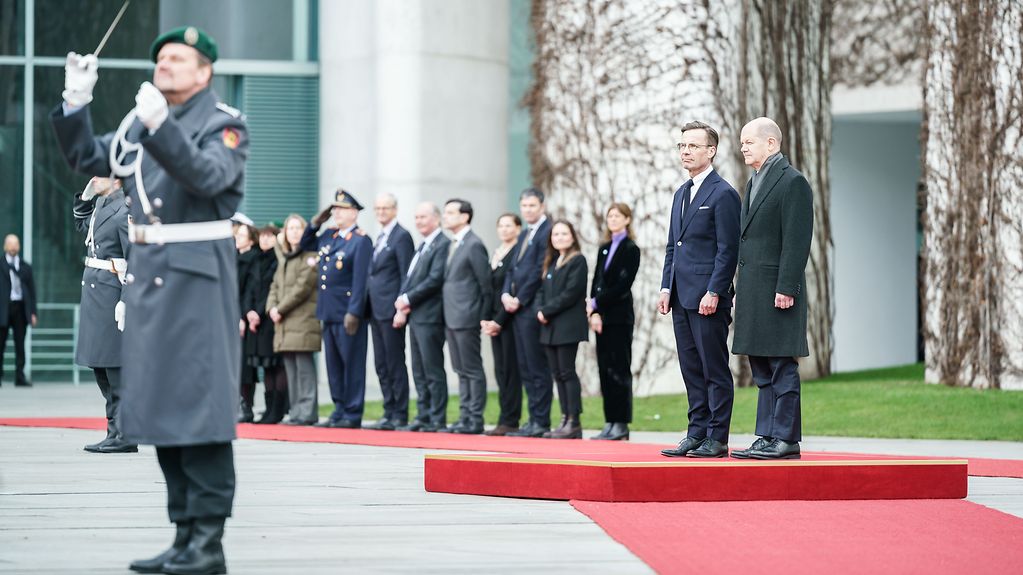Sweden’s Prime Minister in Berlin
During a visit by Prime Minister Kristersson of Sweden, Federal Chancellor Scholz stressed that for Sweden and Finland to join NATO as planned would be a “huge win” for security in Europe. German and Sweden are close friends and partners.
3 min reading time

Visiting friends: the Swedish Prime Minister Ulf Kristersson was received with military honours at the Chancellery.
Photo: Federal Government/Denzel
“You are doubly welcome in Germany,” said Federal Chancellor Olaf Scholz in response to the address given by Sweden’s new Prime Minister Ulf Kristersson at a joint press conference in the Chancellery on Wednesday. Scholz noted that Kristersson was not only visiting in his role as the head of government in Sweden. Sweden also currently holds the half-yearly rotating presidency of the Council of the European Union.
Scholz stressed that Germany and Sweden were close friends and partners, not only on a bilateral level but also within the European Union and internationally. “The excellent relationship between our two countries was once again very clear during our talks today,” said Scholz.
Joining NATO: “a huge win”
Scholz described how Russia’s invasion of Ukraine had been discussed in detail. Alongside the impact on regional security, Scholz said he and Kristersson had discussed the plans for Sweden and Finland to join NATO, along with closer cooperation on security and defence policy. The Federal Chancellor emphasised his view that the two Nordic countries joining NATO would be “a huge win” for the safety and security of the whole of Europe. This was why, he said, Germany was working intensively to ensure that the accession would take place “swiftly and promptly”.
Standing together at Ukraine’s side
Scholz reaffirmed the solidarity of the western international community in the face of Russian aggression: “Together we stand closely by Ukraine’s side. Sweden’s support is an important contribution so Ukraine can oppose Russia’s war of aggression.” The Federal Chancellor expressed his gratitude for Sweden’s pledge to supply launchers for IRIS-T air defence missile systems and modern Leopard 2 battle tanks.
Maintaining European competitiveness
Along with the war in Ukraine, the talks also focused on boosting European competitiveness ahead of discussions on the issue at the European Council meeting in Brussels next week. Scholz welcomed the efforts made by the Swedish Council presidency to develop a long-term strategy to increase competitiveness, and described the EU Commission’s industry plan for the Green Deal as laying the initial foundations for this debate.
Consolidating the single market
Scholz also described the European single market as a pivotal achievement of the EU and argued that protecting it was a key issue. “That’s why there cannot be a subsidy race, neither within the EU nor against third countries,” he said, but he also warned that things cannot remain as they are. “We need to pick up the pace. Our approval processes must speed up and the internal market requires consolidation in many areas.”
A cautious approach to reforming the EU electricity market
Scholz also located discussions on reforming the design of the EU electricity market in this context. Now, he argued, it was a matter of “working towards focused reforms which concentrate on learning the right lessons from the need to deliver the energy transformation, while avoiding interventions which cause long-term harm.” Scholz warned that anyone who wanted to intervene in the market should only do so after clearly considering the potential consequences of their action. “We aren't there yet.”
EU reforms needed
The Federal Chancellor also spoke of his conversation with Kristersson on the EU accession process for the Western Balkan states, Ukraine and Moldova, and potentially for Georgia. Scholz argued that all these states belonged to the European family. At the same time, he said, it was important for the EU to reform itself so as to strengthen itself within and without.
Ulf Kristersson, 59, was born in Lund in Sweden in 1963. This was his inaugural visit to Federal Chancellor Scholz at the Chancellery in Berlin, where he was received with military honours. He has led the government of Sweden as the kingdom’s prime minister since October 2022.